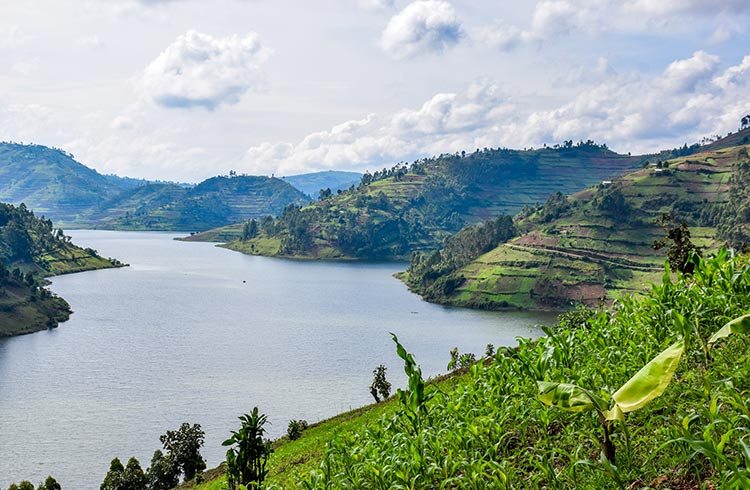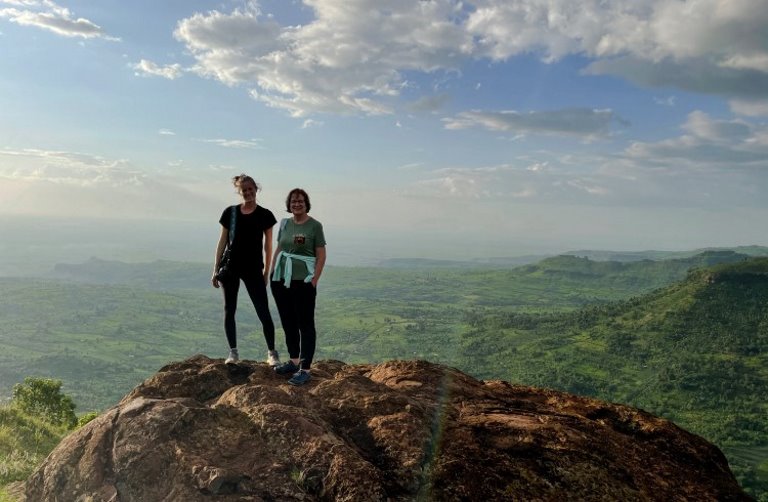Is Uganda Safe? Essential Travel Safety Tips for Visitors
Crime is a serious risk in Uganda. Here's what you need to know to stay safe.
 Photo © Getty Images/Shakked Schwartz
Photo © Getty Images/Shakked Schwartz
31 May 2023 – Anti-LGBTQ+ bill signed into law
- Climate and weather
- Road safety
- Crime in Uganda
- If you are a victim of crime
- Police response
- Terrorism in Uganda
- Staying healthy in Uganda
- Drugs and alcohol in Uganda
- Civil unrest in Uganda
The short answer to the question, "Is Uganda safe?" is "not very". A longer answer appears on 7 March 2022, Uganda Travel Advisory from the U.S. Department of State: "Reconsider travel to Uganda due to crime, and terrorism".
A more subjective answer is that the country is moderately safe for tourists, who should take the usual precautions to be aware of their surroundings, protect their valuables and keep a low profile.
Uganda is an East African, landlocked country with a diverse landscape encompassing the snow-capped Rwenzori Mountains and the immense Lake Victoria. Famous for its mountain gorilla sanctuary at Bwindi and abundant wildlife, it remains a popular tourist destination. Foreign visitors generate nearly 8% of the country's gross domestic product and employ nearly 7% of its total national employment.
If you intend to travel to Uganda, here's what you need to know:
Climate and weather
Uganda's climate is tropical. The country experiences two rainy seasons from March to May and from September to December. One-quarter of its land area lies outside the tropics and experiences the March to October rainy season only. Temperatures range in the mid-70s throughout the year.
Road safety
The roads in Uganda generally lack adequate maintenance, marking, and lighting. Expect broken-down vehicles, wandering pedestrians, and drunk drivers along with stray animals with overall poor roadway conditions. According to the World Health Organization, it has the 21st highest rate of road fatalities worldwide. Pedestrians comprise 40% of all road deaths with riders on small motorized two- and three-wheeled vehicles at 33% of fatal road accidents.
Public transportation, especially inter-city, can be hazardous to passengers who travel in poorly maintained small vans or buses. Ugandan public transportation drivers are generally poorly trained and reckless. Also, watch out for overloaded large trucks with inadequately secured cargo and unreliable braking systems.
There have been reports of highway robbery, including carjacking, by armed bandits outside urban areas. Some incidents have been accompanied by violence. Visitors are cautioned to limit road travel outside towns or cities to daylight hours and travel in convoys, if possible.
Crime in Uganda
The OSAC.gov Uganda Country Security Report warns: "Crime continues to present a serious risk for those visiting or residing in Uganda. Throughout 2020 and 2021, the U.S. Embassy continued to track reports of crimes against organizations and expatriates, including U.S. citizens".
The main cities of Kampala and Entebbe experience violent crimes of armed robbery, and home invasion. The local police frequently lack the resources and skills to respond effectively to serious crime. Outside of the cities, organized gangs have been known to rob and extort residents and visitors. Often gangs block major roads late at night to attack passing vehicles and commit sexual violence against their victims.
Safety tips for visitors include:
- Maintain positive control of all valuables while in public
- Walk on the side of the road facing oncoming traffic, carry only the items and cash that you are willing to lose and keep wallets and other valuables where they will be less susceptible to pick-pockets
- Never leave valuables unattended in a hotel room, especially in the smaller hotels outside the bigger cities
- Only use ATMs at prominent banks and use credit cards only at large hotels and other businesses that have a large international tourist business.
- Visitors are strongly advised to review their personal safety and security posture, to remain vigilant and to be cautious by lowering their public profile when frequenting public places and landmarks.
- Beware of unattended baggage or packages left in any location, including in mini-buses and private taxis.
- Limit the amount of cash you carry and leave valuables, such as passports, jewelry, and airline tickets in a hotel safe or another secure place.
If you are a victim of crime
You should contact the local police, the nearest Embassy and your travel insurance provider where staff can help you find appropriate medical care, contact family members or friends and explain how funds may be transferred. Although the investigation and prosecution of the crime are solely the responsibility of local authorities, consular officers can help you to understand the local criminal justice process and to find an attorney if needed.
The emergency number in Uganda is 999, but reporting a crime directly to nearest the police station will result in a quicker emergency response.
Police response
The Ugandan police have made significant strides in their ability to react to crime and other incidents.
Most police stations throughout the capital city have few phone lines, meager radio communications, and a limited supply of vehicles, which are often in need of fuel. Police attempts to deter crime by placing their limited forces in static locations, supplemented by mobile patrols have been increasingly successful.
Although police corruption is extensive, as evidenced by frequent requests from police officers for "donations" to cover the cost of completing a police report or responding to a traffic accident we have seen an increase in the willingness of police management to intervene and punish those who solicit bribes.
The national emergency police response number is 999. Due to the limitations of the police, many local businesses choose to augment their security by employing private armed guards or watchmen. The quality of these services ranges from poor to adequate.
Foreign currency should be exchanged in authorized banks, hotels and other legally authorized outlets and proper receipts should be obtained for the transactions. Exchange receipts are required to convert unused Ugandan currency back to the original foreign currency. Penalties for exchanging money on the black market range from fines to imprisonment. Credit cards are not accepted at many hotels, restaurants, shops, or other local facilities, although they are accepted at the major chain hotels in Kampala.
Terrorism in Uganda
The US State Department has designated the capital Kampala as a medium-threat location for terrorism affecting U.S. interests. While terrorist groups active in the country have not targeted foreigners, obviously anyone can be a victim of a terrorist attack.
The Australian Smart Traveller website advises travelers to Uganda to exercise a high degree of caution due to the threat of terrorist attacks, civil unrest and criminal activity, adding “Uganda has increased security arrangements in public places due to the threat of terrorist attacks. Expect body, car and luggage checks when traveling. Take official warnings seriously and follow advice.”
The most recent attacks were on 16 November 2021 when two explosions occurred near the Parliament in Kampala.
Staying healthy in Uganda
The Centers for Disease Control has published periodic travel health notices for its visitors. In addition to recommending a host of vaccinations for tropical diseases ranging from malaria to yellow fever, the CDC also lists a variety of health safety precautions including:
- avoiding diseases caused by contaminated water
- preventing bug bites by using an EPA-registered insect repellent
- avoiding contaminated animals, whose bodily fluids can spread Ebola and Marburg Virus and Rift Valley Fever
Only eat food that is cooked and served hot. Eat fruits and vegetables that you have personally washed in clean water or peeled yourself. Never eat food sold by street vendors. Only drink boiled water that is sealed and has been filtered and disinfected. Prefer carbonated drinks, hot coffee or tea, and pasteurized milk.
Travelers to Uganda should also avoid swimming in any lakes, rivers, or still bodies of water. All bodies of water have been found to contain parasites, including schistosomiasis. Uganda has had outbreaks of acute watery diarrhea, cholera, typhoid, and other bacterial diarrhea in the recent past, and the conditions for reoccurrences continue to exist in both urban and rural settings.
Malaria is prevalent in Uganda, especially in rural regions. Travelers who become ill with a fever or flu-like illness while traveling in a malaria-risk area, and up to one year after returning home, should seek prompt medical attention and explain to the healthcare provider their travel history and which antimalarials they have been taking.
Health facilities in Kampala are very limited and are generally inadequate outside the capital. Even the best hospitals in Kampala suffer from inadequate facilities, antiquated equipment, and shortages of supplies (particularly medicines). Visitors are advised to carry their own supplies of prescription drugs and preventive medicines, as well as a doctor's note describing the medication. There is a shortage of physicians, and emergency assistance is limited. Quality psychiatric services are almost nonexistent in Uganda.
Drugs and alcohol in Uganda
Uganda is located along the major narco-traffic routes between the Middle East, Asian, and West African heroin markets. Cannabis also grows throughout the country, is rarely policed, and is a major cash crop in remote areas.
Drug enforcement is lax. The Ugandan Police Anti-Narcotic force is ill-equipped, undermanned, and not well-trained. However, in 2021 a U.S. citizen was arrested for possession of a small amount of marijuana.
Alcohol use among adults in Uganda, according to a report by the National Center for Biotechnology Information, is high. Almost 10% of the adult population in Uganda has an alcohol-use-related disorder. Tourists will find cheap and plentiful alcoholic drinks. Beware of Ugandan Waragi, a potent homemade gin. Its 42% content of alcohol makes it one of the strongest alcoholic drinks in the world.
Also, tobacco smoking in Uganda, especially in public, can bring harsh penalties. Anyone caught smoking in a bar, restaurant, or other public place is liable to arrest with a minimum sentence of six months in jail and a fine of about $130.
Civil unrest in Uganda
Protests, strikes, and demonstrations in Uganda have typically been about local issues. When demonstrations become unruly, police suppression can become violent. The best advice is to avoid large demonstrations and leave the area when demonstrations begin to escalate.
Dial 999 in Uganda to contact the Ugandan Police Force dispatcher. For assistance from the US Embassy in Uganda see this online information page.
Related articles
Simple and flexible travel insurance
You can buy at home or while traveling, and claim online from anywhere in the world. With 150+ adventure activities covered and 24/7 emergency assistance.
Get a quote

No Comments